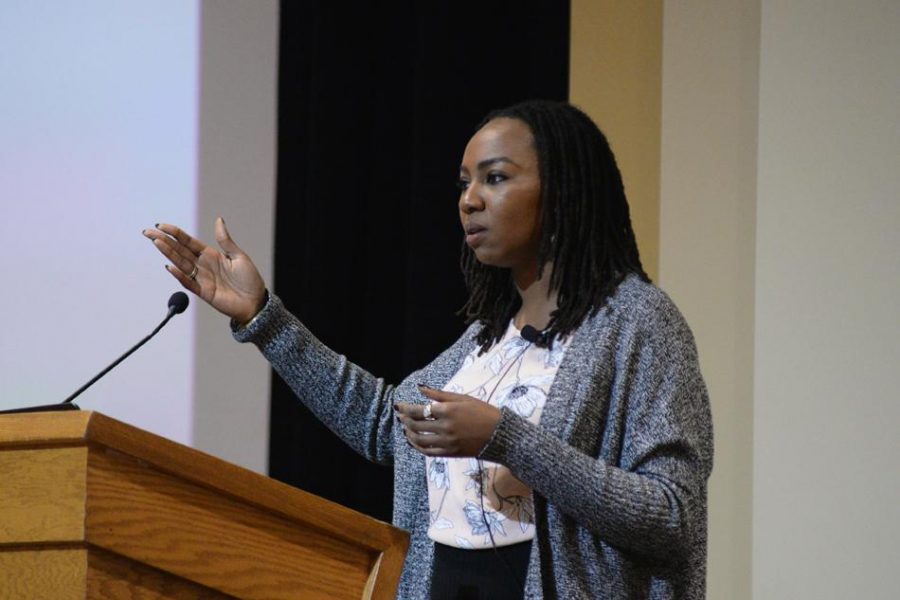Opal Tometi remembers exactly where she was and how she felt the day George Zimmerman’s “not guilty” verdict came in.
“I had just watched [the movie] ‘Fruitvale Station,’ and when I walked out of the theater, my phone was blowing up with texts about the acquittal,” Tometi said.
Tometi, co-founder of the Black Lives Matter movement, was immediately reminded of her younger brother, who was 17, the same age as Trayvon Martin when Zimmerman shot and killed him in Florida in February 2012. To protect her brother and honor Martin’s death, Tometi started the now-famous hashtag behind the national #BlackLivesMatter movement.
Tometi recounted her story to a crowd of about 250 students Tuesday at 6 p.m. in the William Pitt Union Assembly Room. Pitt’s Black Action Society sponsored the event, where Pitt alumnus Robert Timmons II read poetry and I Am Saved Christian Dance Company performed an African dance, in honor of Martin Luther King Jr. Day.
“Black Lives Matter has been an affirmation of inherent beauty, dignity and human rights,” Tometi said. “Embrace the color, embrace the diversity and encourage it.”
Shadeni Cargill, a psychology major at Pitt, began the event by singing the Black National Anthem, which was written in the 1800s and sung at segregated schools in the 1900s. Aminata Kamara, the Social Action Chair for the Black Action Society, followed with opening remarks, noting the impact of the Black Lives Matter message.
“Black Lives Matter is a simple statement to get the conversation going,” Kamara said. “It starts a dialogue.”
Tometi opened her talk with a message on the importance of culture, saying it is “who we are and who we can be.”
Harnessing their sadness and anger after the Zimmerman acquittal, Tometi founded the movement to end systemic racism with her friends, Alicia Garza, special projects director for the National Domestic Workers Alliance of Oakland, California, and Patrisse Cullors, a community organizer from Los Angeles.
The hashtag #BlackLivesMatter spread across Twitter, and Tometi took to the streets of Brooklyn, New York, where she lives, chanting the slogan.
A December 2015 Newsweek cover story about white men dying from prescription and opioid overdoses outraged many members of the black community. Tometi said this story is a dismissal of communities of color, but it is also a telling sign that the movement is creating friction and tension.
She encouraged students to become activists in the movement by joining organizations and student groups committed to the cause, or even by starting a chapter of the Black Lives Matter movement in Pittsburgh.
Pitt students have participated in the Black Lives Matter movement without a chapter by hitting the streets in protest several times since a Staten Island grand jury ruled to not indict the officer who choked Eric Garner to death in 2014.
Zuri Kent-Smith, a first-year majoring in microbiology, posed a question to Tometi about how to respond to critics of the movement, specifically those who cite black-on-black crime. Tometi reasoned that it is a symptom of the structure, and if people are hurt at every stage of the system, they may release their trauma in the form of violence.
“It really re-energizes me to keep moving forward,” Kent-Smith said. “I’m already involved in activist movements, but now I’m thinking about taking more initiative and taking on leadership positions.”
Tometi called on King’s legacy by bookending her talk with quotes from King, emphasizing his well-known themes of protesting peacefully and intervening for justice.
David Garrow, professor of law and history and distinguished fellow at Pitt, has written a series of three biographies on King, and specializes in the black freedom struggle. In his books, Garrow shares lessons from the Civil Rights movement that activists today can apply to the Black Lives Matter movement.
“King was always, without exception, resolutely inclusive in terms of race and ethnicity,” he said. “He always welcomed white participation. At the time of his assassination, he was doing outreach to Hispanic and Latino people, and one of his closest advisors, Bayard Rustin, was openly gay.”
Tometi echoed this call for inclusion of all people in the Black Lives Matter movement.
Students applauded and snapped when she spoke about including all blacks, regardless of gender identity, religious beliefs, location, age or immigration status.
“Differences do not have to lead to disparities,” Tometi said.
Tometi emphasized moving away from heteronormativity and male dominance, as well as welcoming people of all races to work as allies in the movement, creating a “multiracial democracy.”
Morgan Cooper-Okerchiri, a senior majoring in finance and supply chain management, emphasized the power of allies in the movement.
“I think it’s important that people are starting to understand what this is about,” she said. “We have so many white allies here, and it’s important for them to not feel ashamed. Black Lives Matter is supported by all of our allies.”
Gabrielle Wynn, a senior communication major and president of the Black Action Society, gave the closing remarks to Tometi’s talk. She shared what the Black Lives Matter movement means to the black community at Pitt.
“It really helped give a phrase to encompass everybody,” Wynn said. “It really has just reaffirmed that black lives matter and that they need to matter on Pitt’s campus.”



